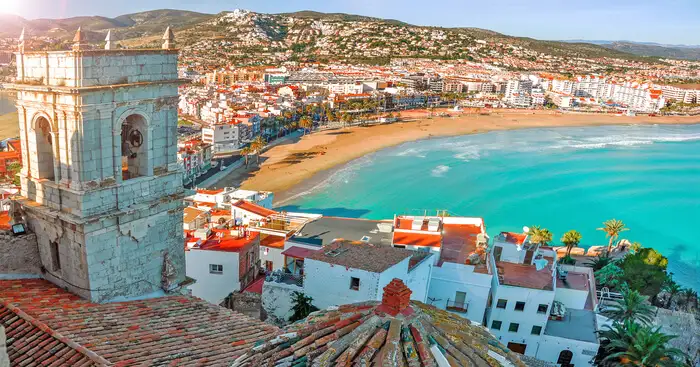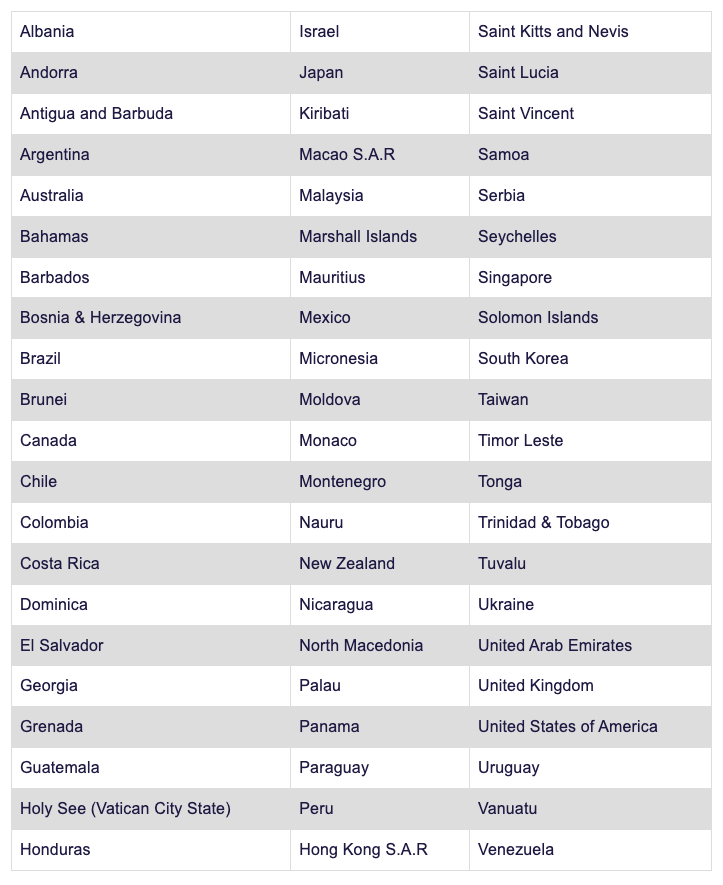Table of Contents
showSpending too much on recruitment, payroll or global HR?
We help you find the Best Providers at the lowest cost.
Dreaming of golden sand and turquoise water, a laidback lifestyle, and eating tapas to your heart’s content? Then you should think about Spain. Even if you’re not thinking of those things now, well, maybe you should be: Spain is a magical place.
If you want the scoop on what it’s like to live and work in Spain and what you need to know before getting there, look no further.
This guide is part of our Work From Anywhere series, where we walk through each piece you’ll need to understand before working remotely from a country. Let’s get started!
What it’s like to live in Spain
Spain offers the best of both worlds in many regards. Mountainous regions and postcard-worthy beaches are both just a quick train ride away from many cities. There’s no shortage of cultural and artistic experiences to take in, and the country enjoys year-round sunshine.


It’s also one of the most affordable countries in Western Europe. Put all this together, and it’s easy to see why so many remote workers are choosing Spain as their home base.
However, before you hit the “Buy Now” button for your airline ticket, make sure you have the logistics and key details ironed out.
Key facts about life in Spain
- Capital: Madrid
- Currency: Euro
- Average cost of living: Depending on the city, a single person could live comfortably on $1,000 to $2,500 per month.
- Climate: Residents enjoy sunny days and a Mediterranean climate, meaning hot summers and mild winters.
- Language: 82% of the population speaks Spanish, also called Castillian. The second most-spoken language is Catalan.
- Food: Spanish cuisine is world-famous for dishes like paella, jamón Iberico, tortilla de patatas, chorizo, and fideuà.
- Taxes: Non-resident remote workers in Spain generally pay a tax rate of 24% on the first €600,000 earned within the country’s borders. However, legislation introduced in July 2021 could offer non-residents a reduced income tax rate of 15% if passed.
Some of Spain’s best cities
Given that there are 17 autonomous regions, all of which offer incredibly diverse scenery, culture, and landscapes, we would need a lot more time to list out all of the wonderful cities Spain has to offer.
To get you started, here are some popular cities in Spain for remote workers:
- Barcelona
- Madrid
- Valencia
- Alicante
- Sevilla
- Barcelona
Digital nomads, creatives, and tourists alike flock to Barcelona for its gorgeous beaches, long history of artistic heritage, and reliable Internet. Barcelona is also known for its diverse population, with nearly a quarter of its residents born abroad representing over 180 different nationalities. Wherever you’re from, you’re sure to find a welcoming community in Barcelona.
Madrid
If you’re looking for a city filled with incredible nightlife, fantastic food, and unique cultural experiences, look no further than the nation’s capital, Madrid. Boasting an excellent public transport system and a high degree of walkability, Madrid is also centrally located, making it an ideal home base for those who plan to explore other regions of Spain.
Valencia
Valencia offers a lively atmosphere and amazing gastronomy, all at an affordable price. As Spain’s second-largest city, it has a reputation for being one of the most cycling-friendly cities in Spain. Valencia is quickly becoming a fan-favorite for remote workers and has plenty of co-working communities to join.
Alicante
If you head south from Valencia along the coast, you’ll find Alicante. Home to some stunning beaches, Alicante attracts beach-goers, divers, surfers, and others looking to soak up as much sun as possible. Many are attracted to Alicante for its thriving nightlife scene, but even if you’re not looking to party, there are tons of opportunities for easy-going fun as well (for example, check out the Santa Bárbara Castle).
Seville
Renowned for its flamenco culture, Seville is the inland capital of the Andalusian province. Located on the Guadalquivir river, one of Seville’s most attractive qualities is its relaxed pace of life. Walkable and affordable, Seville offers all of the charms of a small town with the advantages that come with a big city.
What to know before moving to Spain
Spain has long been an attractive destination for digital nomads, even before the pandemic forced businesses to allow employees to work remotely. An affordable cost of living, access to natural recreation, and a large community of fellow remote workers all make for an attractive place to call home while working remotely.
Make sure you have all the facts on visas, the impact your length of stay can have on your taxes, and applications before you go.
If you plan to stay less than 6 months in one year
Since Spain is a party to the Schengen Agreement, citizens from visa-exempt countries may currently visit Spain for up to 90 days in any 180-day period without a visa.
If you have a passport from one of the following countries, you may visit Spain without a visa for 90 days in a 180-day period:
NOTE: Keep in mind you can stay for a total of 180 days in one year, but they can’t all be consecutive. You can visit for 90 days, leave for 90 days, then visit again for 90 days, totaling 180 days spent in the country in a single year.
ADDITIONAL NOTE: At the end of 2022, the EU will introduce the ETIAS Visa Waiver. It will become a requirement for all the non-EU and non-Schengen countries that can currently enter Spain with just a passport(including the United States). People can apply online for the ETIAS Visa Waiver, and it will be valid for 3 years if approved. However, the 90-day rule for every 180-day period will still apply.
If you didn’t see your country on the index above, no worries. It just means you’ll have to apply for a Schengen Visa. Just like the rules for people with visa-free passports, you’ll be able to stay in the EU for 90 days in a180-day period.
If you plan to stay longer than 6 months
If you plan to stay longer than 6 months, or might even be thinking of relocating permanently, there are a couple of critical details to be aware of:
- You can’t use a regular tourist visa. You’ll need a residence permit. After a while, you can turn your residence permit into a permanent residence.
- New legislation will introduce a digital nomad visa for remote workers. This new visa aims to simplify the residency process for remote workers and gives them access to reduced tax rates. Keep reading for more information.
If you are an EU citizen: You’re golden. Under EU law ,you have the right to permanently live and work in Spain without a visa. After 3 months, you’ll just have to register with the local authorities to obtain a residence certificate to prove you can support yourself financially and have healthcare insurance.
We break down the new visa that will go into effect in 2022.
Spain’s new digital nomad visa
In an effort to further attract remote workers, Spain passed the Startup Act, which includes the creation of a digital nomad visa.
Most notably, remote workers will be allowed to use a non-resident tax status with a rate of 15% for five years rather than being subjected to the current tax rate of 24%.
The digital nomad visa is for internationals from non-European Economic Area countries who either:
- Are employed by a non-Spanish company, or
- Have an income of 20% or less earned from a Spanish company
Another appealing aspect for digital nomad visa holders is a simplified residency application process upon arrival. The details haven’t been fully released but this will be the most straightforward way to obtain residency if you know you want to live and work remotely in Spain for longer than 6 months out of the year.
Digital nomad visa length and documentation
The new digital nomad visa is expected to last for up to 1 year after approval. Currently, it is set to allow visa holders to renew it for a further 2 years if they meet the necessary requirements.
The Spanish government is still finalizing the logistics of the digital nomad visa and has not yet released the requirements.
There is speculation that the proposed required documentation for the new visa could include proof that:
- They have worked remotely for at least a year.
- The work can be carried out remotely.
- If they are under contract to a company, that they have had a professional relationship with the company for at least three months and that the company permits remote work.
- If they are freelance, they work with at least one company outside Spain and provide the terms and conditions of the remote work.
Residence Visa (aka non-lucrative visa)
If you want to work remotely in Spain for longer than 6 months, your best bet is to apply for a digital nomad visa once it’s been implemented.
There is another residency option that often comes up when researching long-term stays in Spain. However, it’s best suited for non-working or retired people. It’s often referred to as a non-lucrative visa. To put it bluntly, you need to have a healthy bank account to go this route.
There are 4 requirements for a non-lucrative visa:
- You can financially support yourself and any family members without working.
- You have sufficient private Spanish medical insurance or International Expat health insurance.
- You are in good health.
- You do not have a police record for any serious crime.
Remote work is something of a gray area when it comes to the non-lucrative visa. While remote work isn’t specifically prohibited, it also doesn’t fit the intent of the visa. However, if you lie on your application or put down misleading information, your application could get rejected.
Our take? Save this one for when you’ve got enough money in the bank to really enjoy living a non-lucrative lifestyle in Spain.
Spain: A Report Card
Here’s where we’ll grade Spain on a number of objective factors about how easy or difficult it is to work and live there. Compare this report card with other countries in our Work From Anywhere guide to see what might fit your needs best.
Ease of short-term stays: A
Why: Like other countries in the Schengen Area, citizens from a lengthy list of countries (see graph above) can visit Spain for periods of 90 days without a visa. Additionally, there’s no shortage of international airports, making Spain an extremely accessible destination for remote workers.
Ease of residence: A-
Why: While the full picture regarding the digital nomad visa hasn’t yet been made clear, it will include a simplified application process for residency in Spain.
Taxes: B
Why: Spain’s current tax rate of 24% is fairly steep, but not out of line with other European countries. However, the proposed introduction of a reduced income tax rate for remote workers of 15% certainly won’t hurt (once it goes into effect, that is.)
Overall score: A-
The beauty of Spain is undeniable. If you’re seeking an abundance of sunshine, an array of outdoor recreational activities, and a friendly, laid back vibe, Spain could be right for you. On top of all this, if the digital nomad visa turns out to be as straightforward as it sounds, it’ll be even easier for remote workers to plan for long-term stays.


